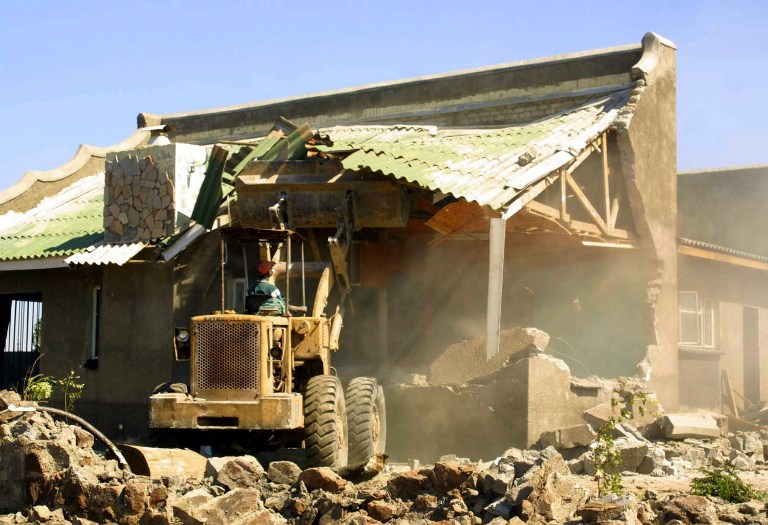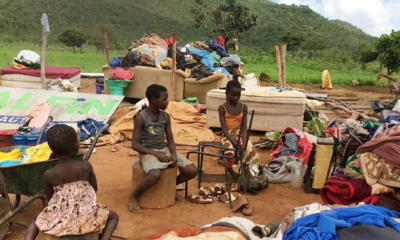IN 2005, when the Zanu PF government embarked on a devastating house demolition campaign which left more than 700 000 urban dwellers homeless, the United Nations issued a scathing report which rattled the corridors of power in Harare.
The UN condemned the mindless destruction as a “disastrous venture”, and demanded that those responsible be punished. Operation Murambatsvina was an “unjustified” violation of international law which caused a massive humanitarian crisis, the UN fumed.
Nineteen years later, not a single official has been brought to justice for that epic crime. If anything, the suffocating sense of impunity has gotten worse in this country. How many innocent lives have been lost since 2005?
Barely three years after that UN admonishment, what happened? Hundreds of opposition supporters were slaughtered in cold blood by Zanu PF thugs and deranged members of the security forces.
In the past fortnight, spine chilling memories have been evoked as thousands of helpless villagers watched their homesteads being razed to the ground. Some were forced to demolish their own homes.
As reported by The NewsHawks, fear has gripped many rural and peri-urban areas in Zimbabwe after the authorities unleashed a new wave of house demolitions leaving countless families homeless.
Already, stranded people are counting their losses in areas including Masvingo and Chipinge. Devastated citizens say they have been reduced to squatters in their own country.
Homesteads, stainstakingly built on the back of immense toil by mostly poverty-stricken Zimbabweans in this tough economy, are being razed to the ground, leaving behind wastelands of rubble.
Human rights lawyers say some of the targeted villagers have lived for than 40 years on the land. The government accuses unscrupulous village heads and land barons of illegally selling state land. Four village heads in Dema, Mashonaland East, have been convicted for selling land illegally in transactions known as “sabhuku land deals”.
But legal experts say although the problem is quite complex, it largely emanates from the Zanu PF government’s refusal to allow black land ownership in rural areas, 44 years after Independence. As a result, 67% of the Zimbabwean population, based in rural areas, is still subjected to a discredited colonial-era arrangement which imposed a legislated state monopoly over land ownership in the countryside.
For reasons of political control and electoral manipulation, the authorities are opposed to the idea of introducing legal title in rural areas, analysts say.
In Chipinge, Manicaland province, the Zimbabwe Lawyers for Human Rights (ZLHR) is representing 327 villagers from Mahachi and Munyokowere villages accused of illegal occupation.
“In Masvingo province, we have filed an appeal at Masvingo Magistrates’ Court seeking to suspend an order for the eviction of some villagers from their ancestral land. The villagers were recently convicted of occupying gazetted land without lawful authority as defined in section 3(1) of the Gazetted Land (Consequential Provisions) Act by Masvingo Magistrate Ivy Jawona and sentenced to serve three months in prison, which was wholly suspended. In addition, Magistrate Jawona ordered the villagers to vacate their land within 7 days,” says ZLHR.
The villagers want the High Court to overturn their conviction and set aside their sentence and refer their matter to the Constitutional Court for a determination of the constitutionality of their arbitrary eviction.
The issue of rural land rights in Zimbabwe is a complex and sensitive one. Lest we forget, the principal grievance of the armed liberation struggle was centred on a racially skewed land ownership system.
Countless lives were lost in the arduous quest to end racist colonial settler rule. The land issue is sacred. That is why most self-respecting Zimbabweans are horrified by what President Emmerson Mnangagwa’s government is doing in Masvingo and Chipinge.
The arbitrary demolition of people’s homes is tantamount to the desecration of Zimbabwe’s founding values. No Zimbabwean should be victimised in this callous manner by a government which claims to be the product of a liberation movement. This is the only country we call home.
Arbitrary evictions without legal recourse have had a detrimental impact on the livelihoods and well-being of many rural communities. When Mnangagwa stands on a hilltop and proclaims ownership over all land in Zimbabwe, he must remember this: the state is only a custodian of this land; Zimbabweans are the real owners.
Political leaders come and go, but the sovereign masses will remain.
The government’s heavy-handedness against helpless citizens raises important questions about property rights, legal protections and the balance of power between the leaders and the generality of our people. It also underscores the need for equitable land reform policies that prioritise the rights and needs of local communities.











